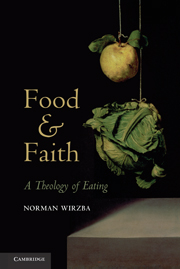Book contents
- Frontmatter
- Contents
- Foreword
- Preface
- 1 Thinking Theologically about Food
- 2 The “Roots” of Eating: Our Life Together in Gardens
- 3 Eating in Exile: Dysfunction in the World of Food
- 4 Life through Death: Sacrificial Eating
- 5 Eucharistic Table Manners: Eating toward Communion
- 6 Saying Grace
- 7 Eating in Heaven? Consummating Communion
- Author Index
- Subject Index
- Scripture Citation Index
1 - Thinking Theologically about Food
Published online by Cambridge University Press: 05 June 2012
- Frontmatter
- Contents
- Foreword
- Preface
- 1 Thinking Theologically about Food
- 2 The “Roots” of Eating: Our Life Together in Gardens
- 3 Eating in Exile: Dysfunction in the World of Food
- 4 Life through Death: Sacrificial Eating
- 5 Eucharistic Table Manners: Eating toward Communion
- 6 Saying Grace
- 7 Eating in Heaven? Consummating Communion
- Author Index
- Subject Index
- Scripture Citation Index
Summary
To live, we must daily break the body and shed the blood of Creation. When we do this knowingly, lovingly, skillfully, reverently, it is a sacrament. When we do it ignorantly, greedily, clumsily, destructively, it is a desecration. In such desecration we condemn ourselves to spiritual and moral loneliness, and others to want.
To eat is still something more than to maintain bodily functions. People may not understand what that “something more” is, but they nonetheless desire to celebrate it. They are still hungry and thirsty for sacramental life.
Why did God create a world in which every living creature must eat?
This is a humbling, even terrifying, question, particularly for people who are intimately involved in the finding, growing, and harvesting of food. Eating is no idle or trifling activity. It is the means of life itself – but also death. For any creature to live, countless seen and unseen others must die, often by being eaten themselves. Life as we know it depends on death, needs death, which means that death is not simply the cessation of life but its precondition. Death is eating's steadfast accomplice. It is also each creature's biological end, for no matter how much or how well we eat (for the sake of life's preservation), we cannot erase our mortal condition. Why eat if eating, even vegetarian eating, implicates us in so much death? Why eat if eating is the daily reminder of our own need and mortality?
- Type
- Chapter
- Information
- Food and FaithA Theology of Eating, pp. 1 - 34Publisher: Cambridge University PressPrint publication year: 2011



